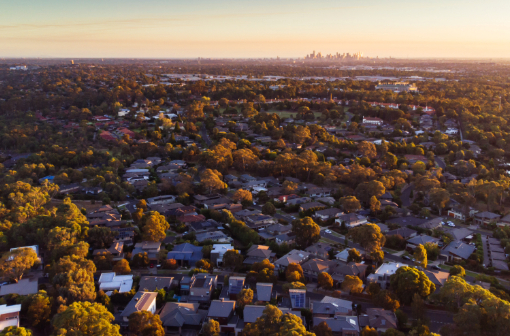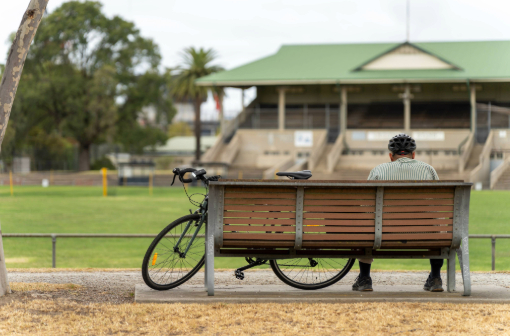“What we also know is that if someone wants to boost their feelings of overall wellbeing they're probably best to work on one of these areas because we know that that will have the biggest impact.”—Dr Kate Lycett, Lead Researcher, Australian Unity Wellbeing Index.
Key points
- The “golden triangle of happiness” refers to the three core areas that support our wellbeing: strong personal relationships, standard of living (financial control) and achieving in life (sense of purpose).
- If we’re looking to boost our wellbeing, it’s likely to be most effective to work on one of these three areas.
- Other factors such as health and personal safety are also important in terms of our overall wellbeing, but these three elements are particularly dominant.
For many people, being well and happy is the ultimate goal in life. However, life isn’t always straightforward—and sometimes the happiness goal can be elusive.
But what if we knew the key to Real Wellbeing? Could we then focus our efforts and fast-track our way to better wellbeing?
The good news is that the research is clear—there is a key to wellbeing and it’s known as the “golden triangle of happiness”.

What is the “golden triangle of happiness”?
Developed in partnership with Deakin University, the Australian Unity Wellbeing Index is a 20-year research study into the wellbeing and life satisfaction of Australians. It says that for people to maintain a positive sense of wellbeing, they need three core elements in their lives:
- Strong personal relationships
- Standard of living (financial control)
- Achieving in life (sense of purpose).
And just as a triangle isn’t complete without its three corners, our wellbeing isn’t the same without these three things.
Dr Kate Lycett, the lead researcher on the Australian Unity Wellbeing Index, agrees that the research shows "really consistently, year in and year out, that these three life areas are the most important".
Kate adds: “What we also know is that if someone wants to boost their feelings of overall wellbeing they're probably best to work on one of these areas if they are low. This is because we know that this will have the biggest impact. One of the reasons for this is because these three keys to happiness not only protect wellbeing, but also promote positive feelings.”
Part one: relationships
Relationships are crucial to our wellbeing and, as social beings, our connections help us to thrive.
The Australian Unity Wellbeing Index reveals that people who are married have the highest wellbeing, followed by those in de facto relationships.
However, the experts say a relationship doesn't necessarily have to be romantic to improve our wellbeing. Instead, we see the benefits when we nurture relationships with people we can rely on and share our world with—whether that's a life partner, close family bonds or simply a fulfilling friendship.
Phil Usher, CEO at First Nations Foundation, an Australian Unity community partner that supports Indigenous financial wellbeing, says it’s critical to our wellbeing that we have someone we can “debrief” with after a stressful day, bounce ideas off and just be completely honest with. These personal relationships allow us to “take off the mask” that we might put up in a professional or social environment and “be our authentic selves,” he says.

Part two: standard of living
The state of our finances and how we approach money has a profound impact on our wellbeing. But earning more doesn’t necessarily mean you’ll be happier.
Australian Unity Wellbeing Index research shows that those on lower incomes can see a marked improvement in wellbeing following a pay rise, with those earning $15,000 to $30,000 annually can boost their wellbeing by one whole point with an extra $3,659.
However, while wellbeing increases with rising incomes, the effect tapers off. An extra wellbeing point for households earning $150,000 to $250,000 requires a whopping $102,941 income boost.
Jigsaw Australia is an Australian Unity community partner that provides training and employment for people with disability. Paul Brown, its CEO, says that while many people strive “to have lots of money and the biggest and best lifestyle”, this isn’t one of the true ingredients of happiness.
It comes back to basics, he says. “Money provides a sense of security and gives people the ability to manage the fundamentals in life such as eating, having somewhere to live and being able to socialise.”
The research supports this view. Regardless of income level, there is a clear link between feeling in control of our finances and our wellbeing.
Part three: achieving in life
The final piece of the golden triangle is that thing that helps us get out of bed in the morning—having a sense of purpose. Whether it’s a job, raising a family, a morning jog, volunteering, tending to the garden or something else entirely, our wellbeing hinges on doing things that create meaning in our lives.
Kate says: “The importance of having a strong sense of purpose in life is by no means new. It's an idea that has prevailed throughout the ages and across cultures. Lots of philosophers have written on it.”
She also emphasises that a sense of purpose is quite personal. “It comes from your engagement in daily activities. For some people, it might be gardening. But for others, it might be increased time with their family or volunteering. It's a very individual thing, and it doesn't matter what it is. It just matters that you have it because we know that people who don't have a sense of purpose can experience negative emotions, feel unmotivated and anxious, and generally feel unsatisfied with their lives.”
Phil agrees, adding that a sense of purpose often involves “contributing to something bigger than yourself. It provides another level of motivation and fulfilment that pushes you well beyond what you would do if you just focused on your individual needs.”

Is there more to happiness?
But relationships, money and purpose aren’t the only factors that affect our overall wellbeing. The Australian Unity Wellbeing Index identifies seven life “domains” that support our wellbeing, with standard of living, personal relationships and achieving in life being joined by health, community connectedness, personal safety, and future security.
Paul says that these additional factors, such as our health and safety, are important. But, from a lifestyle perspective, the three corners of the golden triangle remain paramount in maintaining wellbeing, which in turn helps you to live a well and happy life.
There’s no quick fix for wellbeing, but focusing on your relationships, finances and sense of purpose can give you a greater boost if these areas need work. And that’s worth its weight in gold.
Disclaimer: Information provided in this article is of a general nature. Australian Unity accepts no responsibility for the accuracy of any of the opinions, advice, representations or information contained in this publication. Readers should rely on their own advice and enquiries in making decisions affecting their own health, wellbeing or interest. Interviewee titles and employer are cited as at the time of interview and may have changed since publication.


